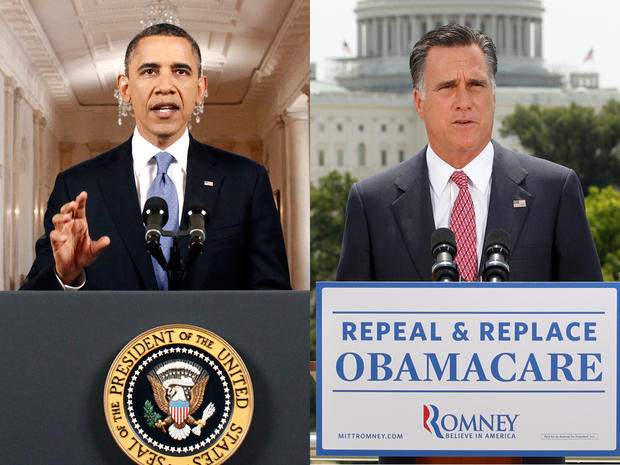Health care "tax" a problem for Obama - and Romney
Updated 12:46 p.m. Eastern Time
(CBS News) Appearing on "CBS This Morning" Friday, House Majority Leader Eric Cantorcorrectly pointed out that the Supreme Court had determined that the individual mandate in the health care law was constitutional not under the Commerce Clause - as the Obama administration had argued - but because of Congress' right to levy taxes.
In the words of Chief Justice John Roberts, who wrote the decision upholding the mandate: "The Affordable Care Act's requirement that certain individuals pay a financial penalty for not obtaining health insurance may reasonably be characterized as a tax."
Cantor pointed to that finding to attack Democrats. "You know what's interesting is throughout the process by this there are promises made by the president, Nancy Pelosi, and others, saying 'Oh no, we're not going to tax people,'" he said. The comment was echoed by Louisiana Gov. Bobby Jindal and Virginia Gov. Bob McDonnell, who both stressed on a conference call with reporters Friday that the law is a tax. Senate Republican Leader Mitch McConnell said simply, in response to the ruling: "The Supreme Court has spoken. This law is a tax."
That notion has quickly become the chief talking point for Republican opponents of the law, who have effectively lost their argument that it is unconstitutional. The National Republican Congressional Committee (NRCC) deemed the law "a big f***ing tax" Friday - a reference to comments by Vice President Biden upon the law's passage- and the conservative group Americans for Prosperity plans to spend $9 million branding the law one of the biggest tax increases ever.
Cantor and other Republicans are correct that Mr. Obama denied the law was a tax. "Nobody considers that a tax increase," he told ABC News in 2009, comparing the law to "a fair way to make sure that if you hit my car, that I'm not covering all the costs." According to the Congressional budget Office, four million people are expected by 2016 to pay a penalty - a tax, if you will - of $695 per person for not securing health insurance coverage. (Democrats have been quick to point out that this is less than 2 percent of the overall population.)
Yet while the ruling that the mandate is a tax creates headaches for Mr. Obama, it also causes problems for his presumptive Republican opponent, Mitt Romney. That's because as Massachusetts governor, Romney passed a state health care law that included an individual mandate. If Republicans are going to accuse Mr. Obama of passing a massive tax increase via the mandate, they're going to have to accept that their presidential nominee did the same thing.
"[W]e established incentives for those who were uninsured to buy insurance," Romney wrote in a USA Today op-ed in 2009, as TPM reported, in describing the Massachusetts plan. "Using tax penalties, as we did, or tax credits, as others have proposed, encourages 'free riders' to take responsibility for themselves rather than pass their medical costs on to others."
This is part of the reason that while Romney said in response to the ruling that "Obamacare raises taxes on the American people by approximately $500 billion" - a claim disputed by Democrats - he did not zero in on the court's finding that the mandate amounts to a tax.
Rick Santorum said during the Republican primary campaign that one reason Romney should not be the Republican presidential nominee is that the former Massachusetts governor can't effectively argue against the health care law. In light of this week's developments, it's hard to imagine he's changed his mind.
The White House, meanwhile, is standing by its contention that the law is not a tax.
Spokesman Jay Carney told reporters on Air Force One Friday that "it's not a tax...it's a penalty." Carney argued that the mandate is not a tax because people have a choice.
If they buy health insurance coverage they don't have to pay it, he argued, while people don't have a choice on paying taxes.
Underlining the fact that the president and his presumptive opponent are linked on the issue, Carney also stressed that the penalty in the Affordable Care Act is "modeled very closely" after the penalty in the health care bill signed by Romney in Massachusetts.
With reporting by Mark Knoller.
